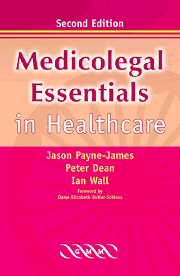Book contents
- Frontmatter
- Contents
- Contributors
- Editors' note for the first edition
- Editors' note for the second edition
- Foreword
- Table of statutes
- Table of cases
- 1 Legal institutions and the legal process
- 2 Human rights and healthcare professionals
- 3 Medical ethics and the forensic physician
- 4 Confidentiality
- 5 Consent to medical treatment
- 6 Professional bodies and discipline
- 7 Complaints in the National Health Service
- 8 The Mental Health Act (England and Wales)
- 9 Death certification and the role of the coroner
- 10 Tissues and organs
- 11 Organ donation
- 12 Living wills
- 13 Euthanasia and end-of-life decision-making
- 14 Abortion and reproductive health
- 15 The Children Act 1989
- 16 Clinical negligence
- 17 Legislation for medicines and product liability
- 18 Clinical trials: ethical, legal and practical considerations
- 19 Medicolegal implications of blood-borne viruses
- 20 Healthcare professionals in court – professional and expert witnesses
- Index
9 - Death certification and the role of the coroner
Published online by Cambridge University Press: 12 January 2010
- Frontmatter
- Contents
- Contributors
- Editors' note for the first edition
- Editors' note for the second edition
- Foreword
- Table of statutes
- Table of cases
- 1 Legal institutions and the legal process
- 2 Human rights and healthcare professionals
- 3 Medical ethics and the forensic physician
- 4 Confidentiality
- 5 Consent to medical treatment
- 6 Professional bodies and discipline
- 7 Complaints in the National Health Service
- 8 The Mental Health Act (England and Wales)
- 9 Death certification and the role of the coroner
- 10 Tissues and organs
- 11 Organ donation
- 12 Living wills
- 13 Euthanasia and end-of-life decision-making
- 14 Abortion and reproductive health
- 15 The Children Act 1989
- 16 Clinical negligence
- 17 Legislation for medicines and product liability
- 18 Clinical trials: ethical, legal and practical considerations
- 19 Medicolegal implications of blood-borne viruses
- 20 Healthcare professionals in court – professional and expert witnesses
- Index
Summary
CORONERS – PAST, PRESENT AND FUTURE
Since the first edition of this book, a number of very significant events, such as the trial and subsequent conviction of Dr Harold Shipman and separate concerns about organ retention following enquiries into events at Alder Hey and other hospitals, have focused the attention of the legal and medical professions and the general public itself on the processes involved in the investigation of sudden death.
The nature of the coronership at present is that it responds to and investigates those deaths which have been referred to it for a wide variety of reasons (just over one third of all deaths in England and Wales at the present time), rather than pro-actively screening all deaths that occur, whether in the community or in hospital, and then determining which ones should be subjected to further scrutiny.
The latter approach is not allowed by the law as it currently stands but, in the wake of Dr Shipman's conviction, there have been three separate enquiries examining the way in which sudden death is investigated, and it is likely that there will ultimately be new legislation and subsequent changes to the way in which all deaths are investigated and the manner in which coroners carry out their duties.
- Type
- Chapter
- Information
- Medicolegal Essentials in Healthcare , pp. 95 - 104Publisher: Cambridge University PressPrint publication year: 2004



